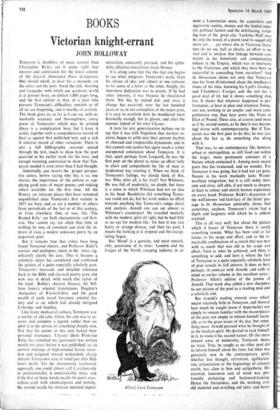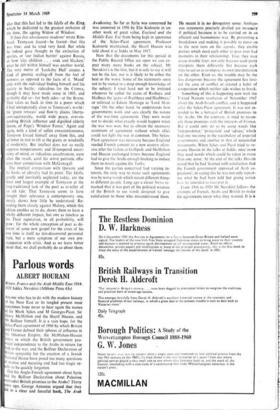Victorian knight-errant BOOKS
JOHN HOLLOWAY
Tennyson is doubtless of more interest than Christopher Ricks; yet it seems right that interest and admiration for the latest volume of the English Annotated Poets (Longmans 84s) should dwell, at least for a moment, on the editor not the poet. Amid the talk, shouting and escapades with which our academic world is at present beset, an edition 1,800 pages long, and the first edition at that, of a poet who presents Tennyson's difficulties, reminds us of all we are forgetting, and is worthy of acclaim. This book gives us, so far as I can see, with re- markable accuracy and thoroughness, every poem of Tennyson's which may be printed (there is a complication here, but I leave it aside), together with a comprehensive record of final as against first published text, and a rich if selective record of other variations. There is also a full bibliography raisonne spread through the text, much to show how the poet quarried in his earlier work for his later, and enough revealing annotation to show that Ten- nyson needed it even more than I had thought.
Admittedly, one inverts the proper perspec- tive unless, before saying why this is so, one stresses the importance of the edition as sup- plying good texts of major poems, and making others available for the first time. All the flowery yet intricate pieces that have remained unpublished since Tennyson's first venture in 1827 are here, and so are a number of others from periodicals of the last or of this century, or from elsewhere. One or two, like The Ruined Kiln,' are both characteristic and first- rate. One cannot say too often that little or nothing by way of comment can rival the in- terest of even a modest unknown poem by an important poet.
But it remains true that critics have long found Tennyson elusive, and Professor Ricki's sources and analogues, taken in the mass, sig- nificantly clarify his case. This is because a scholarly editor has completed and confirmed the picture of a quite especially scholarly poet. Tennyson's incessant and detailed reference back to the Bible and classical poetry goes, one now sees in detail, with much else rather of the kind: Rollin's Ancient History, Sir Wil- liam Jones's oriental translations, Dugdale's Antiquities of Warwickshire, and the great wealth of early travel literature, oriental his- tory and so on, which had already intrigued Coleridge and Southey.
Like many mediaeval authors, Tennyson was a reteller of old tales. Often, his aim was to re- cover and complete a legend, rather than ex- ploit it in the service of something sharply new.
Not that his poems in this vein lacked their personal resonance. 'Ulysses' (here Professor Ricks has remedied my ignorance) was written nearly ten years before it was published; so, its curious melange of high-minded heroic inten- tion and poignant inward melancholy clearly mirrors Tennyson's state of mind just after Hal- lam's death. Yet the distinctively traditional approach, one could almost call it crafmanly or professionalist, is unmistakably there; and if the first of those words recalls the poet's mar- vellous craft with onomatopoeia and melody, the second recalls his intricate metrical experi- mentation, constantly pursued, and his splen- didly effective translations from Homer.
It is along some line like this that one begins to see what integrates Tennyson's work, from his choice of idea and subject at one extreme to his sense of a letter at the other. Simply, his innermost dedication was to poems. If he had other interests, it was because he shouldered them. Yet this he indeed did; and since a change has occurred, over the last hundred years or so, in our conception of the major poet, it is easy to overlook how he shouldered them heroically enough, but in gloom, and after the manner indeed of his own Ulysses. '
A taste for airy generalisation inclines me to say that it was with Napoleon that western so- cieties began to settle into their present rhythm of obsessed and irrepressible dynamism; and in this context one cannot but again reach a rather unexpected conclusion about Tennyson. It is that, apart perhaps from Leopardi, be was the first poet on the planet to make an effort fully to chart and comprehend the life of man as modernism was creating it. When we think of Tennyson's failings, we should think of this, too. Who, after all, is his rival? Not Whitman. He was full of modernity, no doubt, but there is a sense in which Whitman had not an idea in his head. Baudelaire did something Tenny- son could not do, but his work makes no effort towards anything like Tennyson's range, detail and analysis. Arnold one can see almost- as Whitman's counterpart. He wrestled mentally with the modern spirit all right, but he had little or no eye for modern life: for him it was sick hurry or strange disease, and then (as poet, I mean) the looking at it stopped and the excogi- toting began.
But 'Maud' is a genuine, and most remark- able, panorama of its time: London and the fringes of the North, creeping industry in al- Alfred, Lord Tennyson most a Lawrencian sense, the acquisitive and aggressive society, money and the landed inter- est, political faction and the debilitating, isolat- ing roar of the great city. `Locksley Hall' may be only the wreck of a poem (and its sequel- still more so) . . . yet where else in Victorian litera- ture do we see, half so clearly, an effort to re- veal and to analyse that linkage between con- straint in the homeland, and compensating release in the Empire, which was so necessary to the Victorians and which they have been so successful in concealing from ourselves? And In Memoriam shows not only that Tennyson was far from ill-informed about the intellectual issues of his time, knowing his Lyell's Geology and Chambers's Vestiges and the rest (or a good deal of it); but it shows something elA.
too. It shows that whatever happened in per- formance, at least in plan and intention Tenny- son was working in an ampler and more com- prehensive way than later poets like Yeats or Eliot or Pound. These also, of course (and more as if by second nature, as by then it was becom- ing) strove with contemporaneity. But if Ten- nyson was the first poet to do this, he was also about the last to do something else along with it.
That was, to see contemporary life, however urban or metropolitan, as still lived. out within the larger, more permanent contours of a Nature which contained it. Among more recent poets this has evanesced, and no wonder. For Tennyson it was going, but it had not yet gone.
Nature in his work -markedly lacks Words- worthian integration, but it is still richly intri- cate and alive; still able, if not much to deepen, at least to colour and enrich human experience on every band. Professor RickS's discussion of the well-known 'red fool-fury of the Seine' pas- sage in In Memoriam admirably shows that sometimes, anyhow, Tennyson's vision had a depth and largeness with which he is seldom credited.
This is all very well; but about the picture which it leaves of Tennyson there is surely something roseate. What has been said so far relates to his scope and effort, and to the re- markable combination of so much that was new with so-much that was old in his scope and effort. Turn to what he achieved, and there is something to add; and here is where the fact of Tennyson as a quite especially scholarly kind of poet reveals its full interest. It does so best, perhaps, in contrast with Arnold, and calls to mind an earlier volume in this excellent series: Professor Allott's edition of the poems of Arnold. That work also added a new sharpness to our picture of the poet as a reading man and a scholarly one. But Arnold's reading entered areas which meant relatively little to Tennyson, and showed how much he sought (even if imperfectly) not simply to remain familiar with the masterpieces of the past, not simply to inform himself factu- ally as to the great issues of the day, but some- thing more. Arnold pursued what he thought of as the modern spirit. He desired to soak himself in it, to make it his second nature. Of this more inward sense of modernity, Tennyson shows no trace. True, he sought as no other poet did to inform himself about his time; but what was genuinely new in the contemporary, spirit, whether free thought, reformism, egalitarian- ism, -urbanisation or the beginnings of colonial revolt, was alien to him and antipathetic. His essential, innermost cast of mind was pro- foundly archaising and backward-looking. Hence the literariness, and the working over old material and re-telling old tales; and hence also that this last led to the Idylls of the King, which he dedicated to the greatest archaism of the time, the ageing Widow of Windsor.
faut etre absolument moderne' wrote Rim- baud. Tennyson feared—he feared—that this was true; and he tried very hard. But while he indeed gave thought to the extinction of species, or 'our Indian barrier' against Russia, or how 'city children . . soak and blacken,' what he felt within himself was another world. The very metre of 'Locksley Hall' creates a kind of gnomic sealing-off from the feel of newness as opposed to the facts of it. 'Maud' ends with the individual finding himself and his society in battle: ridiculous for the Crimea, though it may have made sense in 1805, and probably did so—for both sides—at the Boyne. That takes us back in time to a poem which I find unexpectedly close to Tennyson's world: the 'green retreats' and flow'ry plains, liberty- cum-squirearchy, world wide peace, ever-ex- panding British influence and dignified elderly Queen, of Pope's 'Windsor Forest.' Again and again, with a kind of sullen conscientiousness, Tennyson forced himself away from this, and set lance in rest to tilt at the giants or windmills of modernity. But intellect does not so easily suppress temperament; and ill-tempered uncer- tainty of mind, or ridiculous anachronism, were often the result, until his worst patriotic effu- sions bear comparison with McGonagall.
The implicit comparison with Quixote and his books of chivalry had its point. The Idylls, greatly and inevitably neglected today, are the finest and largest example of Tennyson at the• long-traditional task of the poet as re-teller of an old tale. That Tennyson seems to have thought their relevance a contemporary one, merely shows how little he understood. Re- reading them closely against Malory, which this edition enables us to do, shows them to have a wholly different impact, but one as timeless as his. Their reputation, in all probability, will grow: for the whole conception of poet as de- liverer of some new gospel for the crisis of his own time is itself no late-discovered perennial truth, but a mere symptom of our own pre- occupation with crisis. And as we learn better about that, we shall probably do so about them.



































 Previous page
Previous page